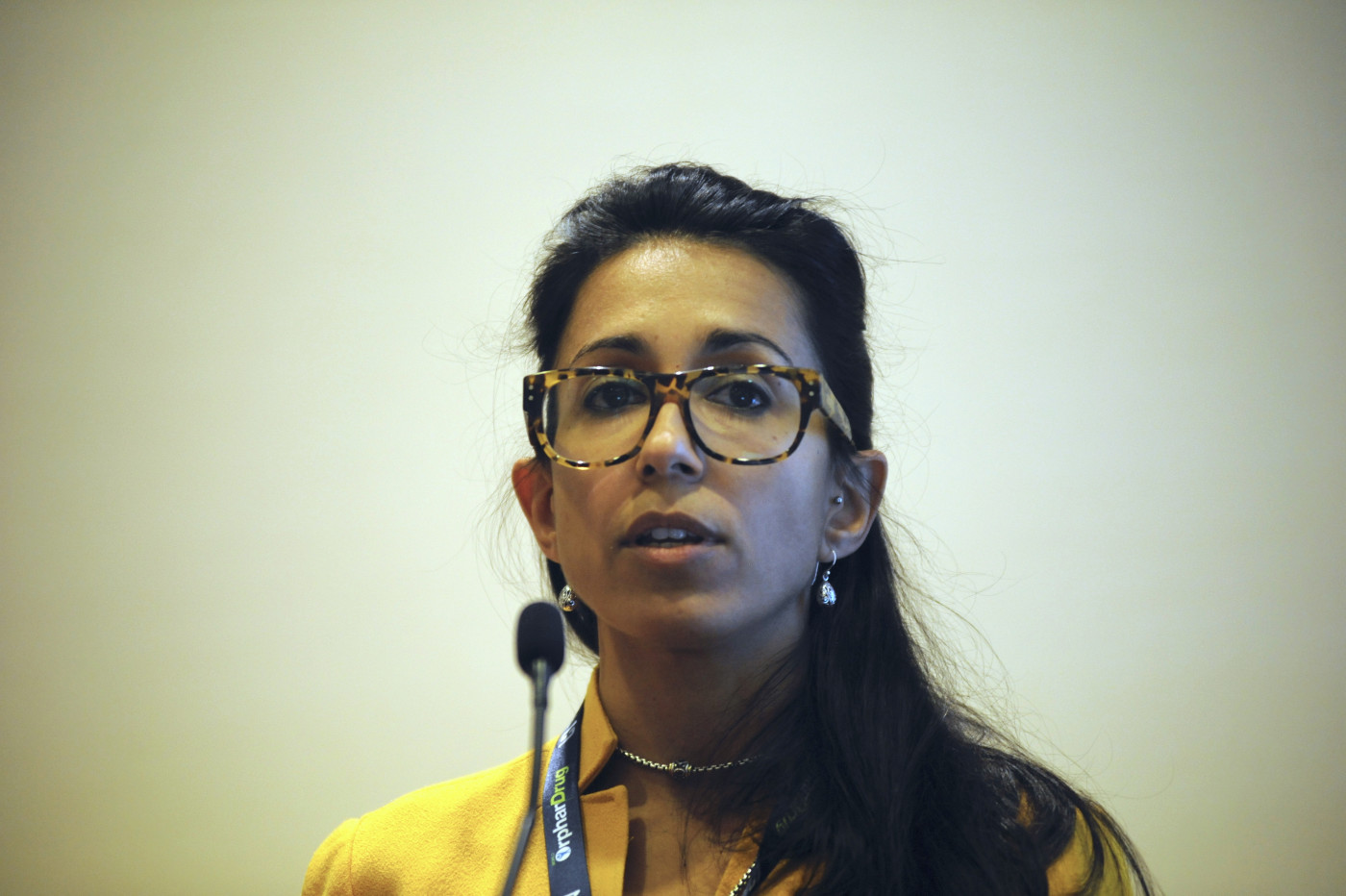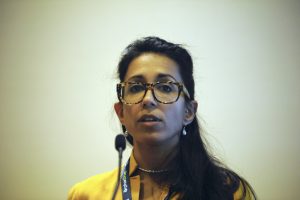Roche Researcher Plans Clinical Trial Seeking Ways to Measure Disease Impact in Home and Clinic

Michelle L. Krishnan, MD, PhD, is leading a Roche trial on Angelman syndrome. (Photo by Larry Luxner)
Swiss pharmaceutical giant Roche plans to begin recruiting this summer for an endpoint study in Angelman syndrome that will not test any drug therapy. Instead, the study aims to find ways to measure disease impact in the home and clinic — and use new technologies to learn about Angelman, and inform the design of potential future clinical trials.
Michelle Krishnan, MD, PhD, is a translational medicine leader in rare diseases at Roche. She spoke to Angelman Syndrome News following her presentation, “Clinical development of an LNA for Angelman syndrome,” at the recent 2019 World Orphan Drug Congress USA in Oxon Hill, Md.
“We are doing this endpoint study to learn how we could, in the future, design a trial for Angelman patients,” she said. “This endpoint study will be a non-drug study, and we do not currently have a drug trial running, although we do have a a drug development program in Angelman.”
Krishnan said recruitment will begin this summer, and will take place at five or six unspecified U.S. sites.
“We started with understanding what the families need through a disease concept model that we completed last year in collaboration with the Angelman Biomarkers and Outcome Measures Alliance, (A-BOM). This is a very important step that is not commonly done to prepare for clinical trials,” she said. “Families tell us what’s important to them. I use that information as I design the trial to measure aspects of Angelman that are meaningful to families and could be used as outcomes in future clinical trials.”
Krishnan, who has a PhD in brain development, was trained as a pediatrician in the U.K. and also did a fellowship at Boston Children’s Hospital. She’s been working on this project at Roche for the past two years.
Angelman, which affects about 1 in every 15,000 births, results from faulty versions of the UBE3A gene and the consequent reduced production of its encoded protein. These faulty versions cause severe cognitive impairment as well as seizures, sleep disturbances, and generally aggressive behavior.
“There’s no approved therapy available. Patients require 24-hour care throughout their lives,” Krishnan said. “It has a tremendous impact on the family, and finding and accessing real world data is often a challenge. Individual registries often have very few patients.”
Roche offers ‘different approach’
For now, all doctors can do to help these patients is prescribe anti-epileptic medications to control seizures. Agilis Biotherapeutics — which was acquired by PTC Therapeutics — is working on a gene therapy candidate known as AGIL-AS to potentially cure the disease.
Ovid Therapeutics is also working on its own small-molecule candidate OV101, also called gaboxadol or THIP. OV101 is derived from muscimol, a natural compound that can be found in mushrooms.
Krishnan said Roche’s approach is different. The company is developing an RNA therapy called a locked nucleic acid antisense oligonucleotide (LNA AON).
“We are planning to develop therapies that could tackle the disease biology, and we hope this will have transformative effects for patients and families,” she said. “We hope it’ll be able to improve the things that are important to Angelman families, like seizures, sleep and [verbal] communications.”
RNA therapies target the underlying cause of some diseases by reducing, modifying, or increasing gene levels through various RNA-interacting mechanisms, Krishnan said. Specifically, LNA AONs have the potential to “unsilence” the paternal UBE3A gene and reactivate it to produce UBE3A protein in the brain.
The study, a “pre-competitive collaboration” among Roche and two other pharma companies — Ionis and Biogen — will also involve wearable devices that measure sleep in an unobtrusive way, she said, adding that Roche also has active drug development programs in other rare diseases, including spinal muscular atrophy, Duchenne muscular dystrophy, Huntington’s disease, and hemophilia A.
Terry Jo Bichell, the outgoing director of A-BOM, is the mother of a young man with Angelman syndrome. She said Krishnan’s research focuses on “measuring what really matters” in the lives of people with this disease, as well as their families.
“In a very calm and competent way, Michelle Krishnan is making great contributions to the field of Angelman syndrome,” she said. “Before she went to Roche, Michelle was a pediatrician — but she also did research on complicated questions that involved genomics and brain imaging. So she really understands the big picture.”







